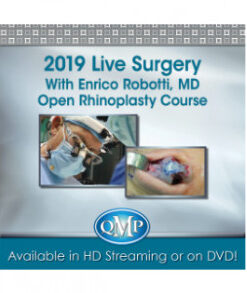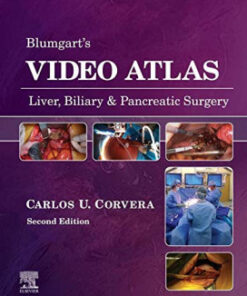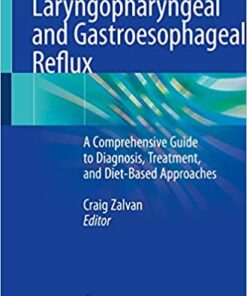Understanding Gastrointestinal Surgery: What You Need to Know
GASTROINTESTINAL SURGERY
Operative Techniques in Breast, Endocrine, and Oncologic Surgery, 2nd Edition (EPUB)
GASTROINTESTINAL SURGERY
GASTROINTESTINAL SURGERY
Operative Techniques in Colon and Rectal Surgery, 2nd Edition
GASTROINTESTINAL SURGERY
2019 Live Surgery With Enrico Robotti Open Rhinoplasty Course
GASTROINTESTINAL SURGERY
Blumgart’s Video Atlas: Liver, Biliary & Pancreatic Surgery 2nd Edition PDF Original & Video
GASTROINTESTINAL SURGERY
GASTROINTESTINAL SURGERY
Robotic Hernia Surgery: A Comprehensive Illustrated Guide 1st ed. 2020 Edition PDF
GASTROINTESTINAL SURGERY
Post-cholecystectomy Bile Duct Injury 1st ed. 2020 Edition PDF
GASTROINTESTINAL SURGERY
Multidisciplinary Management of Gastroesophageal Reflux Disease 1st ed. 2021 Edition PDF
GASTROINTESTINAL SURGERY
GASTROINTESTINAL SURGERY
Management of Hereditary Colorectal Cancer: A Multidisciplinary Approach 1st ed. 2020 Edition PDF
GASTROINTESTINAL SURGERY
Intragastric Balloon for Weight Management 1st ed. 2020 Edition PDF
GASTROINTESTINAL SURGERY
Laparoscopic Colectomy: A Step by Step Guide 1st ed. 2020 Edition PDF
GASTROINTESTINAL SURGERY
Historical Foundations of Liver Surgery 1st ed. 2020 Edition PDF
GASTROINTESTINAL SURGERY
Gastric Bypass: Bariatric and Metabolic Surgery Perspectives 1st ed. 2020 Edition PDF
GASTROINTESTINAL SURGERY
GASTROINTESTINAL SURGERY
Endoscopy in Early Gastrointestinal Cancers, Volume 2: Treatment 1st ed. 2021 Edition PDF
GASTROINTESTINAL SURGERY
GASTROINTESTINAL SURGERY
Endoscopy in Early Gastrointestinal Cancers, Volume 1: Diagnosis 1st ed. 2021 Edition PDF
GASTROINTESTINAL SURGERY
Clinical Decision Making in Colorectal Surgery 2nd ed. 2020 Edition PDF
GASTROINTESTINAL SURGERY
Anorectal Physiology: A Clinical and Surgical Perspective 1st ed. 2020 Edition PDF
GASTROINTESTINAL SURGERY
GASTROINTESTINAL SURGERY
GASTROINTESTINAL SURGERY
Diagnosis and Management Guide for Anorectal Disease: A Clinical Reference 1st Edition PDF
GASTROINTESTINAL SURGERY
Video Atlas: Liver, Biliary & Pancreatic Surgery 2nd Edition PDF
GASTROINTESTINAL SURGERY
Robotic Assisted Hernia Repair: Current Practice 1st ed. 2019 Edition PDF
GASTROINTESTINAL SURGERY
New Treatment Modalities in Rectal Cancer 1st ed. 2020 Edition PDF
GASTROINTESTINAL SURGERY
Techniques of Abdominal Wall Hernia Repair 1st ed. 2020 Edition PDF
Introduction
Gastrointestinal surgery is a complex and often necessary procedure that can help improve the quality of life for those suffering from certain medical conditions. Understanding the process, risks, and potential benefits of gastrointestinal surgery is essential for anyone considering this type of treatment. This article will provide an overview of gastrointestinal surgery, including what it is, why it’s done, and what to expect before, during, and after the procedure. We’ll also discuss the potential risks and complications associated with gastrointestinal surgery, as well as how to prepare for the operation. With this information, you can make an informed decision about whether or not gastrointestinal surgery is right for you.
Overview of Gastrointestinal Surgery: Types, Benefits, and Risks
Gastrointestinal surgery is a type of surgery that focuses on the digestive system, including the stomach, small intestine, large intestine, rectum, and anus. It is used to treat a variety of conditions, such as cancer, ulcers, hernias, and inflammatory bowel disease. Gastrointestinal surgery can be performed laparoscopically or open, depending on the condition being treated.
The benefits of gastrointestinal surgery are numerous. It can help to reduce pain, improve digestion, and restore normal functioning of the digestive system. In some cases, it can even cure certain diseases. For example, gastrointestinal surgery can be used to remove tumors or polyps from the colon, which can help to prevent colorectal cancer. Additionally, gastrointestinal surgery can be used to repair hernias, which can help to reduce the risk of complications associated with hernias.
Despite the many benefits of gastrointestinal surgery, there are also risks associated with the procedure. These include infection, bleeding, and damage to surrounding organs. Additionally, there is a risk of developing an abdominal hernia after the surgery. Other potential risks include blood clots, organ failure, and adverse reactions to anesthesia.
Overall, gastrointestinal surgery is a safe and effective way to treat a variety of conditions. However, it is important to discuss the potential risks and benefits with your doctor before undergoing the procedure. Your doctor will be able to provide you with more information about the specific risks and benefits associated with your particular condition.
Pre-Surgery Preparation: Tests, Procedures, and Diet
Pre-surgery preparation is an important step in the surgical process. It involves a variety of tests, procedures, and dietary changes that are designed to ensure the patient is healthy enough for surgery and to reduce the risk of complications during and after the procedure.
Tests: Before any surgery, it is important to have a thorough physical examination. This includes blood tests, urine tests, chest X-rays, and other imaging tests such as CT scans or MRIs. These tests help the doctor determine if there are any underlying medical conditions that could complicate the surgery or increase the risk of complications.
Procedures: Depending on the type of surgery, the doctor may also recommend certain procedures before the operation. For example, if the patient is having abdominal surgery, they may need to have a colonoscopy or endoscopy to check for any abnormalities in the digestive tract. Other procedures may include electrocardiograms (ECGs) to check the heart’s electrical activity, or echocardiograms (ECHOs) to check the heart’s structure and function.
Diet: The doctor may also recommend changes to the patient’s diet before the surgery. This may include avoiding certain foods that can increase the risk of bleeding during the procedure, such as leafy greens, garlic, and onions. The doctor may also recommend increasing the intake of certain vitamins and minerals, such as iron, vitamin C, and zinc, to help the body heal faster after the surgery.
Pre-surgery preparation is an important part of the surgical process. By following the doctor’s instructions and making the necessary changes to their diet and lifestyle, patients can help ensure that their surgery goes as smoothly as possible and that they recover quickly and safely.
Post-Surgery Care: Recovery Time, Pain Management, and Follow-up Appointments
Post-surgery care is an important part of the healing process. It is essential to follow your doctor’s instructions and take the necessary steps to ensure a successful recovery. This includes understanding the expected recovery time, managing pain, and attending follow-up appointments.
Recovery Time
The amount of time it takes to recover from surgery varies depending on the type of procedure and the individual’s health. Generally, it can take anywhere from a few days to several weeks or months. During this time, it is important to rest and follow your doctor’s instructions for activity levels. You may need to limit physical activities such as lifting, bending, and twisting. Additionally, you should avoid strenuous activities such as running or playing sports until your doctor has cleared you.
Pain Management
Pain management is an important part of post-surgery care. Your doctor will likely prescribe medications to help manage your pain. It is important to take these medications as directed and to not exceed the recommended dosage. Additionally, you may find that over-the-counter medications such as ibuprofen or acetaminophen can help with mild pain. If you are experiencing severe pain, contact your doctor immediately.
Follow-up Appointments
It is important to attend all follow-up appointments with your doctor. These appointments allow your doctor to monitor your progress and make sure that you are healing properly. During these appointments, your doctor may check your incision site, ask about any pain or discomfort you may be experiencing, and discuss any other concerns you may have.
Post-surgery care is essential for a successful recovery. Understanding the expected recovery time, managing pain, and attending follow-up appointments are all important parts of the healing process. Following your doctor’s instructions and taking the necessary steps to ensure a successful recovery will help you get back to your normal activities as soon as possible.
Common Complications of Gastrointestinal Surgery
Gastrointestinal surgery is a major operation that can have serious complications. The most common complications of gastrointestinal surgery include infection, bleeding, and obstruction. Other potential complications include anastomotic leak, fistula formation, and organ injury.
Infection is one of the most common complications of gastrointestinal surgery. Infections can occur in the incision site or in the abdominal cavity. Symptoms of infection may include fever, redness, swelling, and drainage from the incision site. Treatment for infection typically includes antibiotics and wound care.
Bleeding is another common complication of gastrointestinal surgery. Bleeding can occur at the incision site or in the abdominal cavity. Symptoms of bleeding may include dizziness, lightheadedness, and shortness of breath. Treatment for bleeding typically includes blood transfusions and medications to help control the bleeding.
Obstruction is a blockage of the intestines that can occur after gastrointestinal surgery. Symptoms of obstruction may include nausea, vomiting, abdominal pain, and bloating. Treatment for obstruction typically includes medications to help relax the muscles of the intestines and surgery to remove the obstruction.
Anastomotic leak is a complication that occurs when the connection between two parts of the intestine fails to heal properly. Symptoms of anastomotic leak may include fever, abdominal pain, and diarrhea. Treatment for anastomotic leak typically includes antibiotics and surgery to repair the leak.
Fistula formation is a complication that occurs when an abnormal connection forms between two organs or between an organ and the skin. Symptoms of fistula formation may include drainage from the area of the fistula and pain. Treatment for fistula formation typically includes antibiotics and surgery to repair the fistula.
Organ injury is a complication that occurs when an organ is damaged during surgery. Symptoms of organ injury may include abdominal pain, fever, and difficulty breathing. Treatment for organ injury typically includes antibiotics and surgery to repair the damaged organ.
Gastrointestinal surgery is a major operation that can have serious complications. It is important to discuss the risks and benefits of the procedure with your doctor before undergoing any type of gastrointestinal surgery.
Nutrition After Gastrointestinal Surgery: What to Eat and Avoid
Nutrition after gastrointestinal surgery is an important part of the recovery process. Eating a balanced diet can help you heal and regain your strength. It is important to follow your doctor’s instructions for what to eat and avoid after surgery.
After gastrointestinal surgery, it is important to focus on eating nutrient-dense foods that are easy to digest. This includes lean proteins, fruits, vegetables, whole grains, and healthy fats. Protein is especially important for healing and repairing tissues. Good sources of protein include fish, poultry, eggs, beans, nuts, and seeds. Fruits and vegetables provide essential vitamins and minerals, as well as fiber to help with digestion. Whole grains such as oats, quinoa, and brown rice are also good sources of fiber. Healthy fats like olive oil, avocados, and nuts can help keep you full and provide energy.
It is also important to stay hydrated after surgery. Aim to drink at least 8 glasses of water per day. You may also want to incorporate other fluids such as herbal teas, vegetable juices, and low-fat milk.
In addition to focusing on nutrient-dense foods, there are certain foods that should be avoided after gastrointestinal surgery. These include high-fat and fried foods, processed meats, refined carbohydrates, and sugary drinks. High-fat foods can be difficult to digest and can slow down the healing process. Processed meats contain preservatives and additives that can irritate the digestive system. Refined carbohydrates such as white bread and pasta can cause blood sugar spikes and can lead to weight gain. Sugary drinks can also cause blood sugar spikes and can contribute to weight gain.
Eating a balanced diet after gastrointestinal surgery is essential for a successful recovery. Focus on eating nutrient-dense foods that are easy to digest, and avoid high-fat, fried, processed, and sugary foods. Staying hydrated is also important. Following these guidelines can help you heal and regain your strength.
Conclusion
Understanding Gastrointestinal Surgery is an important topic for anyone considering or undergoing this type of procedure. It is important to be aware of the risks and benefits associated with the surgery, as well as the potential complications that may arise. Additionally, it is important to understand the different types of gastrointestinal surgeries available, and to discuss any questions or concerns with your doctor prior to the procedure. By being informed and prepared, you can ensure that your experience with gastrointestinal surgery is as safe and successful as possible.






























